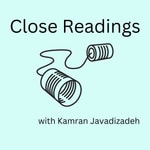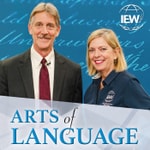Close Readings – Details, episodes & analysis
Podcast details
Technical and general information from the podcast's RSS feed.

Close Readings
Kamran Javadizadeh
Frequency: 1 episode/18d. Total Eps: 54

One poem. One guest. Each episode, Kamran Javadizadeh, a poetry critic and professor of English, talks to a different leading scholar of poetry about a single short poem that the guest has loved. You'll have a chance to see the poem from the expert's perspective—and also to think about some big questions: How do poems work? What can they make happen? How might they change our lives?
Recent rankings
Latest chart positions across Apple Podcasts and Spotify rankings.
Apple Podcasts
🇬🇧 Great Britain - books
26/07/2025#89🇬🇧 Great Britain - books
24/07/2025#81🇬🇧 Great Britain - books
22/07/2025#76🇬🇧 Great Britain - books
20/07/2025#65🇬🇧 Great Britain - books
19/07/2025#68🇬🇧 Great Britain - books
18/07/2025#49🇨🇦 Canada - books
17/07/2025#90🇬🇧 Great Britain - books
17/07/2025#36🇬🇧 Great Britain - books
16/07/2025#45🇫🇷 France - books
04/04/2025#93
Spotify
No recent rankings available
Shared links between episodes and podcasts
Links found in episode descriptions and other podcasts that share them.
See allRSS feed quality and score
Technical evaluation of the podcast's RSS feed quality and structure.
See allScore global : 58%
Publication history
Monthly episode publishing history over the past years.
Huda Fakhreddine on Hiba Abu Nada ("Pull Yourself Together")
Episode 48
lundi 13 mai 2024 • Duration 01:30:30
What can a poem do in the face of calamity? This was an extraordinary conversation. Huda Fakhreddine joins the podcast to discuss "Pull Yourself Together," a poem that Huda has translated into English and that was written by the Palestinian poet, novelist, and educator Hiba Abu Nada. Hiba was killed by an Israeli airstrike in her home in the Gaza Strip on October 20, 2023. She was 32 years old.
In the episode, Huda describes watching a clip of Hiba reading the poem. You can find that clip here.
Huda Fakhreddine is Associate Professor of Arabic literature at the University of Pennsylvania. She works on modernist movements and trends in Arabic poetry and their relationship to the Arabic literary tradition. She is the author of Metapoeisis in the Arabic Tradition (Brill, 2015) and The Arabic Prose Poem: Poetic Theory and Practice (Edinburgh UP, 2021) and the co-editor of The Routledge Handbook of Arabic Poetry (Routledge, 2023). She is also a prolific translator of Arabic poetry: you can find another of her translations of HIba Abu Nada in Protean. Follow Huda on Twitter.
Please follow the podcast if you like what you hear, and leave a rating and review. Share an episode with a friend. You can also subscribe to my Substack, where you'll get occasional updates on the podcast and my other work.
Emily Wilson on Sappho ("Ode to Aphrodite")
Episode 47
lundi 25 mars 2024 • Duration 01:27:15
This is the kind of conversation I dreamed about having when I began this podcast. Emily Wilson joins Close Readings to talk about Sappho's "Ode to Aphrodite," a poet and poem at the root of the lyric tradition in European poetry. You'll hear Emily read the poem in the Ancient Greek and then again in Anne Carson's English translation. We talk about the nature of erotic desire, what it's like to have a crush, and how a poem can be like a spell.
Emily Wilson is Professor of Classical Studies at the University of Pennsylvania, where she holds the College for Women Class of 1963 Term Professor of the Humanities. She is a celebrated translator of Homer, having translated both The Odyssey and, more recently, The Iliad (both from Norton). Wilson has also published translations of Euripides, Sophocles, and Seneca—and is the author of three monographs: The Greatest Empire: A Life of Seneca (Oxford, 2014), The Death of Socrates: Hero, Villain, Chatterbox, Saint (Harvard, 2007), and Mocked with Death: Tragic Overliving from Sophocles to Milton (Johns Hopkins, 2004). You can follow Emily on Twitter.
If you like what you hear, please follow the podcast and leave a rating and review. Share an episode with a friend! And subscribe to my Substack, where you'll get very occasional updates on the podcast and my other work.
Eric Lindstrom on James Schuyler ("Empathy and New Year")
Episode 38
lundi 1 janvier 2024 • Duration 02:00:05
"New Year is nearly here / and who, knowing himself, would / endanger his desires / resolving them / in a formula?" So asks James Schuyler in this episode's poem, "Empathy and New Year." No resolutions for me this year, but instead an indulgence, a gift to myself, and I hope to you: my friend Eric Lindstrom rejoins the podcast to talk once again about Schuyler, poetry, and friendship.
Eric Lindstrom is Professor of English at the University of Vermont and the author of two books: Romantic Fiat: Demystification and Enchantment in Lyric Poetry (Palgrave, 2011) and Jane Austen and Other Minds: Ordinary Language Philosophy in Literary Fiction (Cambridge, 2022). He is now completing a third book, James Schuyler and the Poetics of Attention: Romanticism Inside Out, which would be the first scholarly monograph dedicated to Schuyler's work.
Please follow, rate, and review the podcast if you like what you hear, and share an episode with a friend. Subscribe to my Substack, where you'll get the occasional update on the podcast and on my other work.
David B. Hobbs on George Oppen ("Ballad")
Episode 37
lundi 18 décembre 2023 • Duration 01:57:10
Why might a poet set poetry aside for more than two decades and then return to it? What would the return sound like? When, as a young man, George Oppen stopped writing poetry, it was because, in his words, "I couldn't make the art I wanted to make while also pursuing the politics I wanted to pursue." David Hobbs joins the podcast to discuss "Ballad," one of the poems Oppen wrote upon his return to poetry.
David B. Hobbs is an assistant professor of English at the University of Lethbridge in Alberta, where he is working on his first monograph, What Can You Do Alone?: Lyric Sociality & the Global Depression. He is also the editor of George Oppen's 21 Poems (New Direcitions, 2017). You can read David's introduction to that volume in The New York Review of Books and his scholarly article on Oppen in Modernism/modernity.
Please remember to follow the podcast, and, if you like what you hear, leave a rating and review. Share an episode with a friend! And follow my Substack, where you'll get occasional updates on the podcast and my other work.
Jahan Ramazani on Derek Walcott ("A Far Cry from Africa")
Episode 36
lundi 11 décembre 2023 • Duration 01:41:42
How can a poet choose between his language and his idea of home? A postcolonial turn this week, as Jahan Ramazani joins the podcast to talk about Derek Walcott's "A Far Cry from Africa."
Jahan Ramazani is University Professor and Edgar F. Professor and the Director of Modern and Global Studies in the Department of English at the University of Virginia. He is the author of several books, most recently Poetry in a Global Age (Chicago, 2020).
Please follow, rate, and review the podcast if you like what you hear. Share an episode with a friend. And subscribe to my Substack, where you'll get occasional updates about the podcast and my other work.
Elisa Gabbert on Sylvia Plath ("Lady Lazarus")
Episode 35
lundi 27 novembre 2023 • Duration 01:42:46
What a searching, stimulating conversation this was. Elisa Gabbert joins the podcast to talk about a poem she and I have both long loved, Sylvia Plath's "Lady Lazarus."
Elisa is a poet, critic, and essayist—and the author of several books. Her recent titles include Normal Distance (Soft Skull, 2022), The Unreality of Memory (FSG Originals, 2020), and The Word Pretty (Black Ocean, 2018). She has a new book of essays coming out next year: Any Person Is the Only Self (FSG, 2024). Elisa writes the "On Poetry" column for The New York Times, and she regularly reviews new books of poetry there and elsewhere. You can follow Elisa on Twitter.
Please follow, rate, review, and share the podcast if you like what you hear. And subscribe to my Substack, where you'll get occasional updates about the podcast and other news about my work.
Hanif Abdurraqib on Umang Kalra ("Job Security")
Episode 34
lundi 20 novembre 2023 • Duration 01:13:10
A conversation I've been wanting to have for a long time: Hanif Abdurraqib joins the podcast to talk about Umang Kalra's poem "Job Security."
Hanif is a poet, essayist, and cultural critic from Columbus, Ohio. He is the author of A Little Devil in America: Notes in Praise of Black Performance, A Fortune for Your Disaster, Go Ahead in the Rain: Notes to a Tribe Called Quest, They Can't Kill Us Until They Kill Us, and The Crown Ain't Worth Much. He has a new book coming out in March, 2024: There's Always This Year: On Basketball and Ascension. You can find links to all of these titles on Hanif's website. Follow Hanif on Twitter.
If you enjoyed the episode, please share it with a friend, and follow, rate, and review the podcast. Subscribe to my Substack, where you'll get an occasional newsletter to update you on the pod and my other work.
Ellen Bryant Voigt on Louise Glück ("Brooding Likeness")
Episode 33
vendredi 10 novembre 2023 • Duration 01:05:29
The last of three episodes in our cluster on Louise Glück: one of her oldest and dearest friends, the marvelous poet Ellen Bryant Voigt joins the podcast to talk about Louise's poem "Brooding Likeness."
Ellen's books of poetry have recently been assembled into a staggering single volume, Collected Poems (Norton, 2023). She is also the author of two books of prose: The Flexible Lyric (Georgia, 1999) and The Art of Syntax (Graywolf, 2009).
A couple notes on things that come up in the episode:
Ellen discusses Louise's autobiographical note for the Nobel Prize. You can find that autobiographical piece here.
We listen, during the episode, to a recording of Louise reading "Brooding Likeness." The recording contains an alternate phrase in its penultimate line, and during the episode Ellen and I surmise that it was an earlier version of the poem than the one that appeared in The Triumph of Achilles.
I've since been able to confirm that. The poem first appeared (with the penultimate line as she reads it here) in The New Yorker on April 12, 1981. The reading we listen to happened on October 22, 1981. The book version, with the version of the line we both prefer, wouldn't be published until 1985.
I hope these three episodes on Glück will add something to the beautiful array of memories that have appeared in writing since her passing. I think the guests speak to each other, even as I talk to them one on one, and they do so through their mutual devotion to the poetry of their friend.
Please share, rate, and review the podcast if you like what you hear. And subscribe to my Substack to get occasional updates on my work.
Langdon Hammer on Louise Glück ("A Foreshortened Journey")
Episode 32
mercredi 8 novembre 2023 • Duration 01:24:52
The second episode in our cluster on the great Louise Glück, who won the 2020 Nobel Prize in Literature, and who passed away on October 13.
Lanny Hammer rejoins the podcast to talk about his friend and colleague Louise and her poem "A Foreshortened Journey."
Langdon Hammer is Niel Gray, Jr. Professor of English at Yale University, where he studies poetry and its place in the culture. Among his recent publications are James Merrill: Life and Art (Knopf, 2015) and A Whole World: Letters from James Merrill (Knopf, 2021), which he edited with Stephen Yenser. Lanny has also remembered Louise in print: you can find pieces by him about her in The Yale Review and The Paris Review.
I hope you'll hear the beautiful resonances that begin to emerge between the episodes in this cluster—and that, via the poems, they'll give you some sense of the person, the life, and the world she made and left behind.
Make sure you're following the podcast to get new episodes as they roll out, and please share, rate, and review the podcast if you like what you hear. Follow my Substack to get occasional updates on the pod and my other work.
Elisa Gonzalez on Louise Glück ("A Village Life")
Episode 31
lundi 6 novembre 2023 • Duration 01:43:40
After a little hiatus, the podcast returns with a cluster of new episodes on the great, late poet Louise Glück, recipient of the 2020 Nobel Prize in Literature. Louise passed away on October 13.
First up we have the brilliant poet and writer Elisa Gonzalez, who knew Louise as both teacher and friend. Elisa has chosen the poem "A Village Life" for our conversation.
Elisa's first collection of poems, Grand Tour, was just published by Farrar, Straus and Giroux. About the book, Louise Glück wrote, "These poems make me feel as if poems have never before been written." You can find Elisa's poems, essays, and stories in places like The New Yorker, The Atlantic, Harper's, The Point, The Drift, and The New York Times Magazine. Follow Elisa on Twitter.
You can find Elisa's memorial piece for Louise here, in The Paris Review.
The other conversations in this cluster will roll out over the course of this week—make sure you're following the podcast to get them as soon as they come out.
Please share, rate, and review the podcast if you like what you hear. And subscribe to my Substack, where you'll get occasional newsletters to update you on the podcast and my other work.









